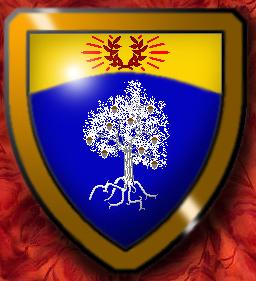Things to Know about Yule in the Barony Beyond the Mountain
 For many years now, the Barony Beyond the Mountain has celebrated
For many years now, the Barony Beyond the Mountain has celebrated
certain traditions as part of our Yule feast. In more recent times we
have been pleased and honored to bring them to a joint Yule with our
cousins of Bergental. If you are planning to attend Yule feast this year on December 2 or in the future, a quick read will help you to enjoy your time with us.
The first thing is that we ask everyone to please refrain from lighting their own candles. The provision of light for the tables is part of the
observances.
At the beginning of the feast before the food is served, First Foot, a
child embodying the spirit of the season enters the hall and leaps over
the yule log which will be set before High Table. After taking a flame
from the yule log, First Foot asks the populace “Would you have the
spirit of the season enter this hall?” The proper response is “Aye.”
First Foot lights the candles at High Table, and then proceeds
throughout the hall, lighting a candle for each table. It is traditional
to offer First Foot a coin for luck, which are provided on each table.
A pitcher of scented water is presented to High Table, that Their
Majesties, Their Highnesses, and Their Exellencies may refresh their
hands prior to presentation of the feast.
Salt is formally presented to the High Table. If Their Excellencies in
consultation with Their exchequers have determined that Their lands have
prospered in the prior year, salt is also provided to the populace to
season their meals.
The pantler presents a specially baked loaf of bread to High Table, and
slices and serves it to Their Majesties, Their Highnesses and Their
Excellencies.
The butler presents drink to the High Table. To ensure the quality of
the bottle, s/he will open it and sample the contents to confirm its worth.
The toasts are offered during the meal as is traditional in the Kingdom.
However, in honor of the holiday season, the customary response of
“vivant” is replaced by “wassail!”
During the feast, the boar’s head is processed through the hall while
the “Boar’s Head Carol” is sung.
Should the nobles and populace of the hall be deemed to be generous,
hospitable, and welcoming, there is a gift, in the form of twelve
sterling silver rings. Should you find one, it represents luck for the
coming year.
A Little History or Where on Earth Did They GET This Stuff?
The Barony Beyond the Mountain has celebrated our Yule feast with some
variation of these traditions and ceremonies for over thirty years. But
what do they mean? Where do they come from? All of them are grounded (if
loosely) in some part of history, although over the years things have
changed and shifted to suit the people and the event, and while the
history is still visible through the cracks, it is now a tradition of
our own.
First Foot: First Foot is a tradition of Scotland/Northern England,
which says that the first person to set foot over the threshold of a
home on New Year’s Day will bring good fortune for the coming year. In
the original tradition, First Foot brings gifts.
Yule Log: Current tradition holds that the Yule log has its origins in
the fire ceremonies of pre-Christian paganism that celebrate the return
of the sun at the turn of the year. As most sites do not have a hearth
suitable for the day-long burning of a log, the barony utilizes a
symbolic representation.
Hand-washing: Medieval books of manners describe ritual hand-washing
both before and after the meal. The water and towels were presented in
order of the social standing of the guest, and it was an honor to thus
serve a king or great noble.
Salt: Salt has been a valuable commodity throughout history. Universally
valuable for both seasoning and food preservation, salt was mined,
produced, transported, taxed, sold, and sometimes used as currency.
Hence it was a demonstration of wealth on the medieval table, and in the
great houses would be served in ornate salt cellars and nefs that were
placed in front of the host or most honored guest.
Pantler: The pantler (from the Middle English pantelere) was the servant
of a great house who was in charge of the bread and the pantry. When
bread is baked in a wood fired oven, the upper portion is more
desirable, as it will not be ashy or over-baked. Interestingly, the
phrase “upper crust” does not appear to have been applied to *people*
until the nineteenth century.
Butler: the butler (from the Anglo-Norman buteler, a variant of the Old
Norman butelier and Old French botellier – all variants on
boteille/bottle) was the servant of a great house who was in charge of
the service and care of the household’s beverages, whether in barrels or
bottles.
Wassail: from the Old English wæs hæl – “be you healthy,” and associated
with the drinking tradition of wassailing in Southern England which is
done to ensure a good cider apple harvest for the following year.
Boar’s Head: the hunting and serving of boar is ancient. The procession
of the boar’s head to the singing of the “Boar’s Head Carol” originated
at Queen’s College in Oxford England. It has continued to this day.
Rings: In England the Christmas cake/pudding sometimes had coins added
as good luck touch pieces at least as far back as the 19th century. Even
if no older than that, it is a charming tradition.
– Article submitted by Baroness Eloise of Coulter
